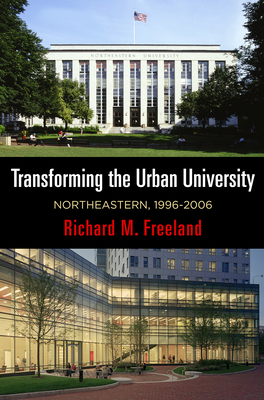Transforming the Urban University: Northeastern, 1996-2006

Transforming the Urban University: Northeastern, 1996-2006
In Transforming the Urban University, Richard M. Freeland reviews how Northeastern University in Boston, historically an access-oriented, private urban university serving commuter students from modest backgrounds and characterized by limited academic ambitions and local reach, transformed itself into a selective, national, and residential research university. Having served as president during a critical decade in this transition, Freeland recounts the school's efforts to retain key features from Northeastern's urban history--an emphasis on undergraduate teaching and learning, a curriculum focused on preparing students for the workplace, its signature program of cooperative education, and its broad involvement in the life of the city--while at the same time raising admission standards, recruiting students on a regional and national basis, improving graduation rates, expanding opportunities for research and graduate education and dramatically improving its U.S. News ranking.
Freeland situates the Northeastern story within the evolving context of urban higher education as well as broader trends among American universities during the second half of the twentieth century. He documents the way Northeastern maintained its historic values while making innovative use of modern marketing techniques to meet the competitive conditions of the academic marketplace. He shows how Northeastern rejected the standard model of the modern research university and instead reinvented itself as a new kind of urban university: making excellence in the undergraduate experience its top priority; stressing practice-oriented education and research; and emphasizing the academic benefits of its urban setting as well as the importance of contributing to the well-being of its host city. In chronicling Northeastern's recovery from what the school's trustees called a near-death experience, Freeland challenges the conventional narrative of what a university must do to achieve top-tier national status.PRP: 569.50 Lei
Acesta este Prețul Recomandat de Producător. Prețul de vânzare al produsului este afișat mai jos.
512.55Lei
512.55Lei
569.50 LeiLivrare in 2-4 saptamani
Descrierea produsului
In Transforming the Urban University, Richard M. Freeland reviews how Northeastern University in Boston, historically an access-oriented, private urban university serving commuter students from modest backgrounds and characterized by limited academic ambitions and local reach, transformed itself into a selective, national, and residential research university. Having served as president during a critical decade in this transition, Freeland recounts the school's efforts to retain key features from Northeastern's urban history--an emphasis on undergraduate teaching and learning, a curriculum focused on preparing students for the workplace, its signature program of cooperative education, and its broad involvement in the life of the city--while at the same time raising admission standards, recruiting students on a regional and national basis, improving graduation rates, expanding opportunities for research and graduate education and dramatically improving its U.S. News ranking.
Freeland situates the Northeastern story within the evolving context of urban higher education as well as broader trends among American universities during the second half of the twentieth century. He documents the way Northeastern maintained its historic values while making innovative use of modern marketing techniques to meet the competitive conditions of the academic marketplace. He shows how Northeastern rejected the standard model of the modern research university and instead reinvented itself as a new kind of urban university: making excellence in the undergraduate experience its top priority; stressing practice-oriented education and research; and emphasizing the academic benefits of its urban setting as well as the importance of contributing to the well-being of its host city. In chronicling Northeastern's recovery from what the school's trustees called a near-death experience, Freeland challenges the conventional narrative of what a university must do to achieve top-tier national status.Detaliile produsului











